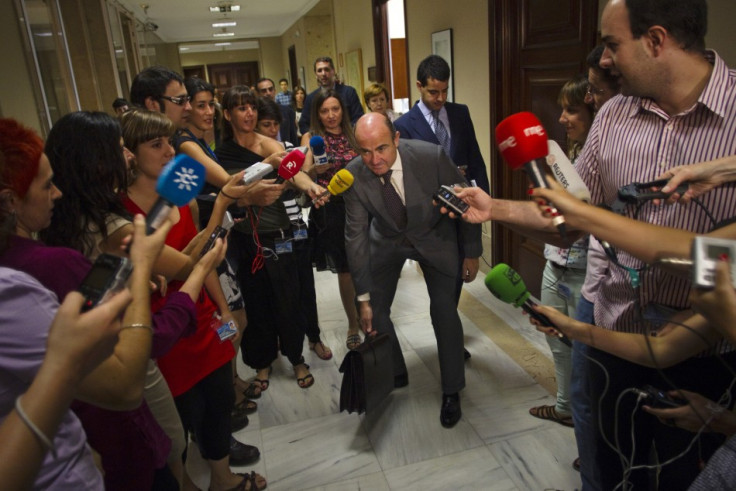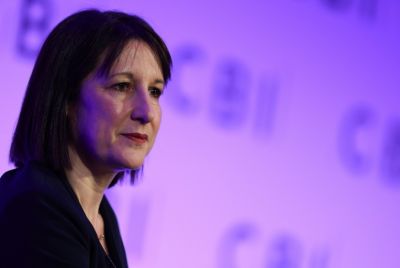European Crisis: Spain in Focus Amid Intensifying Concern Over Euro

- Spanish yields hit record high
- German business confidnece slumps in July
- UK GDP confirms worst double-dip recession in more than 50 years
1400 BST: Back at the tiller
... following a sturdy look at the horrific UK GDP figures and penning this editorial on what it means for the economic strategy of Prime Minister Cameron and Chancellor Osborne.
1130 BST: He may have a point
Italy's centre-left Democratic Party leader Pier Luigi Bersani tells reporters his one-on-one with Prime Minister Mario Monti focused on the "very, very worrying general situation" in the Italian economy.
"There is a need to follow-up on the decisions of the European Summit and the state of alert that all institutions are facing," he added.
It's a view echoed by France's President, Francois Hollande, according to his spokesperson, Naja Vallaud-Belkacem. "It's absolutely necessary to implement decisions made at the June European Summit quickly and firmly," Vallaud-Belkacem told reports in Paris today as France's Finance Minister Pierre Moscovici welcomes Spanish Economy Minister Luis de Guindos for talks after his visit to Berlin yesterday.
1040 BST: Bund market oddity
German September bund futures have fallen 66 ticks on the session to trade at 144.37 while Germany sells €2.322bn in a 30-year bund "tap" that draws a record low yield of 2.17 percent (24 basis points lower than at teh previous sale).
0955 BST: Sound off (part 2)
In general the weakness was more broad-based and more acute than expected. Some aspects of the data continue to look dubious - not least the scale of the reported decline in construction output - but, looking through the statistical noise, the underlying picture looks weaker than expected. This increases the chances of further monetary policy easing, but we do not expect any action prior to November (when the current QE purchases are concluded).
- Ross Walker: RBS European Economics
0950 BST: Sounding off
Anyone pinning their hopes on the Olympics being the answer to our recessionary problems is likely to be sorely disappointed and what we are likely to see arise from today's figure is our central bank chasing its tail even more by doing further QE later this year."
- Angus Campbell: Head of Market Analysis at Capital Spreads
0945 BST: Gilt yields plunge
Two-year gilt yields fell to a record-low 0.049 percent in the wake of the abysmal bad UK GDP figures while Sterling fell to a 12-day low of $1.5485 against the US Dollar.
Breaking the figures down, the ONS says construction and manufacturing both had the biggest quarter-on-quarter contraction in at least three and half years.
0935 BST: GDP meltdown
Britain's economy shrank an astonishing 0.7 percent in the three months ending in June, the Office for National Statistics said, extending the worst double-dip recession in at least 50 years.
The monthly 0.7 percent decline was the biggest single quarter-on-quarter dip in at least three years, the ONS said, while the year-on-year contraction of 0.8 percent was the steepest since the fourth quarter of 2009. Both figures were well shy of analysts' forecasts of 0.2 percent and 0.3 percent respectively.
0910 BST: German business confidence
The Ifo Institute's business climate index fell to 103.3 in July from a revised 105.2 in June, well below the 104.7 consensus. The current conditions portion of the survey was measured at 111.6 versus analysts' forecast of 113.0. The expectations portion was 95.6 from a revised 97.2 in June.
Collectively, the figures seem to suggest modest GDP growth of around 0.1 percent in Germany for both the second and third quarters, according to Ifo economist Klaus Wohlrabe, who added he does *not* see the possibility of Germany losing its triple-A credit rating.
0905 BST: ECB lending survey
The central bank's quarterly survey of members' lending shows more than 10 percent have increased credit standards in the three months ending in June and an equal amount expect to do the same in the coming quarter.
Perhaps more worryingly, at least a quarter of Europe's banks said they saw a "significant" drop in loan demand during the second quarter and that the sovereign debt crisis had a substantial impact on banks' funding conditions during the three-month period.
0850 BST: Data delay
Italy's statistics agency, ISTAT, will delay the release of this month's consumer confidence figures by 30 minutes this morning due to industrial action by ISTAT staff who are protesting the Italian government's plans to reform public-sector labour markets. The number fill be released at 0930 BST.
0815 BST: Refinancing risk
Moody's Investors Service reminds us that corporate life goes on even amid a sovereign debt crisis that threatens to forever alter the world's second-largest econonmic bloc. The ratings company published a report this morning that estimates that as much as $1.2tn in corporate debt will need to be refinanced by the 308 largest companies in Europe, the Middle East and Africa over the next four years.
Throughout the euro area sovereign debt crisis, companies have been cautious about capital spending and paying dividends, and have taken advantage of windows for favourable market access to issue debt. Moody's notes that companies still have the capacity to weather a temporary bond market closure, however the continuing euro area sovereign debt crisis could start to erode their cash piles.
0810 BST: Good Morning
European shares are kicking-off the mid-week session on the back foot, with a 0.4 percent dip for the FTSE 100 and similar declines for markets in Spain and Italy. Germany's benchmark DAX index is holding losses to around 0.1 percent in the first few minutes of trading. The broadest measure of European shares, the FTSE Eurofirst 300, is down around 0.3 percent to 1,015.31
Shares in Asia fell for a second consecutive session after disappointing second-quarter results from Apple and renewed concern that China's slowing economy and the Eurozone debt crisis will put the brakes on a fragile global recovery.
The region's benchmark index, the MSCI Asia Pacific Index, fell 1.1 percent during the session to a one-month low before recovering marginally near the end of the trading day. The European single currency remained fixed overnight at a 25-month low of 1.2072 again the US dollar as global investors prepare for another day dominated by bond market headlines in and around the Eurozone.
September German bund futures rose 8 ticks at the start of trading Wednesday to 145.45 while benchmark 10-year bunds were marked at 1.24 percent.
Spanish borrowing costs surged to yet another record high this morning with 10-year bonds trading at 7.73 percent and the country's benchmark 2-year notes rising 46 basis points and past 7 percent (7.10) for the first time since the introduction of the single currency in 1999.
© Copyright IBTimes 2024. All rights reserved.






















